The Most Famous Combat Surgeon of the Revolutionary WAR
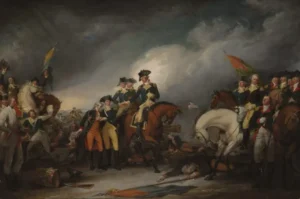
A wounded Monroe is supported after The Battle of Trenton. “The Capture of the Hessians at Trenton, December 26, 1776” by John Trumbull, (Yale University Art Gallery)
Few medics can have been said to impact the world as clearly as Dr. J Riker. Often, we are put in places where our actions mean the difference between life and death, and sometimes those we assist go on to great things.
Dr. Riker is one of those medics.
Volunteering on the eve of one of the most important American victories of the Revolutionary War, Riker was on hand to save the life of a young man who then went on to become one of our nations first presidents.
Here is the story:
On December 22nd, 1776, General George Washington and the Continental Army under his command were in a terrible predicament.
Washington had under his command 4,707 troops fit for duty, but as the harsh East Coast winter turned nasty, he knew he was about to lose a large number of his force.
In a few short weeks, his number of troops would be cut to 1500 men. When the new year came around, a large portion of his men would be lost to military enlistments running out.
And soon, the Delaware River would be totally frozen over, allowing the British troops to cross and pursue him through the frozen waste land.
This far into the campaign, Washington and his men had suffered many defeats and moral was at an all time low. He knew he needed a victory to bolster the men’s moral, but to also prove to congress that his cobbled together fighting force of civilian Americans could stand against the professional army regulars of the British Empire.
America needed a win, and Washington thought he knew how to make one happen.
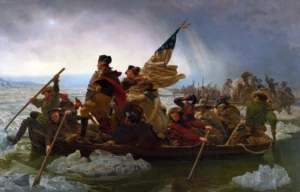
“Washington Crossing the Delaware” by Emanuel Leutze. 1851
He chose an isolated garrison of Hessian soldiers at an outpost in Trenton which consisted of 1400 experienced fighting men. Washington was certain they'd be in a vulnerable position after the Christmas festivities and were likely to be still asleep and drunk in the early morning hours when the attack was planned.
Then, the enemy would be forced to fight with a physical condition no soldier savors: hangover.
The plan was for Washington to lead a force of 2400 troops down from the North after crossing the Delaware, made famous by the wildly inaccurate, but undeniably epic painting “Washington Crossing the Delaware.”
Meanwhile, command was given to his cousin, Captain William Washington and charged him taking a small vanguard of men, about 50 or so, to prevent any messengers from entering or leaving the sleepy river town with information.
Volunteering to accompany the captain on his mission, a young Lieutenant stepped up by the name of James Monroe, only 18 years of age at the time.
The small force of men moved to their positions in the pitch darkness of the winter night on their way to Trenton. As they crept along, a nearby farmhouse began a ruckus of barking hound dogs, alerting everyone in the area suspicious men were about.
The farmer, Dr. John Riker, left his home to investigate the commotion and came across the captain, his young lieutenant, and their men.
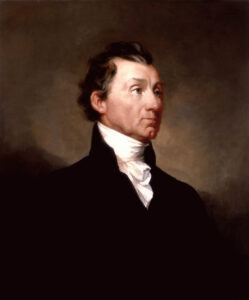
James Monroe 5th president of the United States of America (White House Portrait)
At first thinking they were British troops, he at once became belligerent and voiced his many unhappy opinions of the British empire. President Monroe later recalled in his memoirs about meeting Dr. Riker:
“He was very violent and determined in his manner, and very profane and wanted to know what we were doing there on such a stormy night.”
After a time of enduring the harassment from the good Doctor, Monroe had enough and threatened to arrest the man if he didn’t go away. Soon after, Dr. Riker realized his mistake and changed his tune dramatically.
Seeing now that they were not the enemy, support poured out from the farmer, and he invited them all into his home to feed them breakfast before the coming battle.
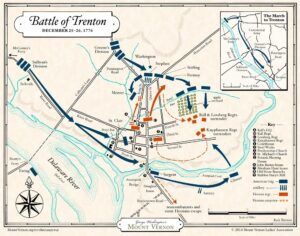
Then, after his guests were well fed and warm, Riker began to get ready himself, declaring to all present:
“I know something is to be done, and I’m going with you. I’m a doctor, and I may be of help to some poor fellow.” And it was fortunate for the young Monroe that he did.
The small band of men, now with the added benefit of a doctor trained in medicine at Princeton University, moved north along the river, carrying out their mission of preventing the escape or entry of runners carrying vital information.
Only 2 American casualties were sustained during the fighting, the first being Captain Washington who was shot and taken away from the field of battle to the waiting surgeons table Dr. Riker had set up in a nearby townhome for just such a situation.
Meanwhile, the young Lieutenant stepped up to take command, but was soon wounded himself by a Hessian bullet in the shoulder. The bullet severed an artery, and he began to bleed profusely and would have died if he had not been swiftly transported to the Doctor who was already seeing to the care of the Captain.
Dr. Riker was able to clamp the artery and control the bleeding in Monroe's shoulder and save his life.
The enemy troops were routed in a decisive victory that only cost the lives of 2 American soldiers who froze to death during the hike south after crossing the Delaware.
The Battle of Trenton was the first real victory of the American forces of civilians fighting for their homeland. The gamble Washington made paid off in the last possible moments before the end of the year. His army began to swell with new recruits, moral was bolstered by the recent victory, and re-enlistments were frequent.
The victory also proved to the new American government, civilians, and British Empire that this rag tag, cobbled together army of squirrel hunters and farmers could fight and a force that deserved respect.
Washington kept up his momentum and on Jan, 3rd, he won another victory at Princeton, furthering the nation’s confidence in his leadership and command on the battlefield.
Later, the General would recall of young Monroe:
“The zeal he discovered by entering the service at an early period, the character he supported in his regiment, and the manner in which he distinguished himself at Trenton, where he received a wound,” and that Monroe had “in every instance maintained the reputation of a brave, active, and sensible officer.”
Monroe was known for the negotiation of the Louisiana Purchase before going on to become the nation’s 5th president were he also acquired Florida from Spain, who was all too eager to give it up on account of all the man-eating gators and rednecks already infesting the swamps…
Medical skills are one of those things where you will always have a situation in your life where it will become necessary to save the life of someone you love, your own life, or maybe, just maybe, the life of a future president and impact the world forever.
https://www.myrevolutionarywar.com/battles/761226-trenton/
https://emergingrevolutionarywar.org/2016/01/12/james-monroe-at-the-battle-of-trenton/
